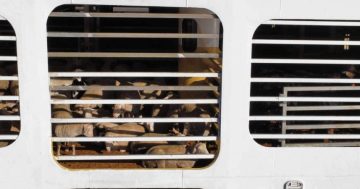
Department of Agriculture, Fisheries and Forestry secretary Adam Fennessy has given reasons for rejecting a re-export application. Photo: ANZSOG.
A decision taken by the Department of Agriculture, Fisheries and Forestry to reject an application to re-export more than 15,000 sheep and cattle to the Middle East has been welcomed by animal rights groups, but questions remain over the welfare of the livestock.
The government has also been grilled over why the next move for the animals’ welfare has been left up to the exporter.
An application was submitted on 26 January by exporter Bassem Dabbah for the animals onboard the MV Bahijah to be shipped to the Middle East via the Cape of Good Hope.
It was submitted after the first attempt to export the livestock was abandoned because of Houthi rebel attacks in the Red Sea.
The animals have been onboard the vessel off the WA coast at Fremantle for more than a month, with just a few hundred moved onshore.
But DAFF ruled that it was not satisfied that the required criteria for re-exportation had been met in the application, and it was concerned that transport arrangements were not sufficiently appropriate to ensure the animals’ welfare.
Department secretary Adam Fennessy stated on Monday (5 February) that the application had been rejected.
“The departmental regulator was unable to be satisfied, in accordance with subsection 8-6(3) of the Export Control (Animals) Rules 2021, that: the requirements of the Export Control Act 2020 in relation to the export of livestock have been complied with, or will be complied with before the livestock are imported into the importing country; and the importing country requirements relating to the livestock have been met, or will be met before the livestock are imported into the importing country; and the arrangements for the transport of the livestock to their final overseas destination are appropriate to ensure their health and welfare,” the statement said.
“In making this decision, the regulator has considered all relevant information from a variety of sources.
“This decision-making required thorough and detailed engagement with the legislative scheme and consideration of all available evidence and submissions, in real time as this complex situation evolved.”
The department continues to work with stakeholders to manage the health and welfare of the livestock and uphold Australia’s biosecurity.
“Throughout this whole process, Australia’s biosecurity and the health and welfare of the animals on board have remained the department’s highest priorities,” the secretary said.
“Applications to export live animals undergo complex assessments that balance Australian biosecurity, export legislation, animal welfare considerations and the requirements of our international trading partners.
“The livestock on the vessel continue to be in good health, and they remain under veterinary care and supervision. There is no suspicion of exotic pests or diseases within the livestock.
“The next steps for the livestock onboard the vessel are commercial decisions for the exporter.”
But independent MP Andrew Wilkie told Federal Parliament on Tuesday that it should not be left up to the exporter to decide what to do with the animals.
“The conditions on this vessel are already well known to all of us and it beggars belief that we even have to have a debate about doing something urgently,” Mr Wilkie said.
“We can only speculate the stifling conditions and … bizarrely, the department is still leaving the next steps up to the exporter.”
The Australian Alliance for Animals said the situation was the latest “depressing episode in the long and tragic story” that is Australia’s live sheep export trade.
Policy director Jed Goodfellow said the government’s promised phase-out could not come soon enough.
“The department has absolutely made the right call with this decision, but we hold serious concerns the exporter will now make a fresh application to re-export these animals,” Dr Goodfellow said.
“We call on the exporter to do the right thing and abort the consignment. These animals have been through enough – over a month of standing and lying in their own waste and enduring oppressive heat and humidity at high stocking densities.
“The exporter must now bring their ordeal to an end by immediately unloading the animals here in Australia.
“If the exporter fails to do this, the Department of Agriculture should utilise all regulatory powers at its disposal to compel the exporter to unload the animals.”
Agriculture Minister Murray Watt ‘noted’ DAFF’s decision and said he had spoken with WA Agriculture Minister Jackie Jarvis.
“I am advised that the next steps for the livestock on board are the responsibility of the exporter,” Mr Watt said.
Original Article published by Chris Johnson on Riotact.





